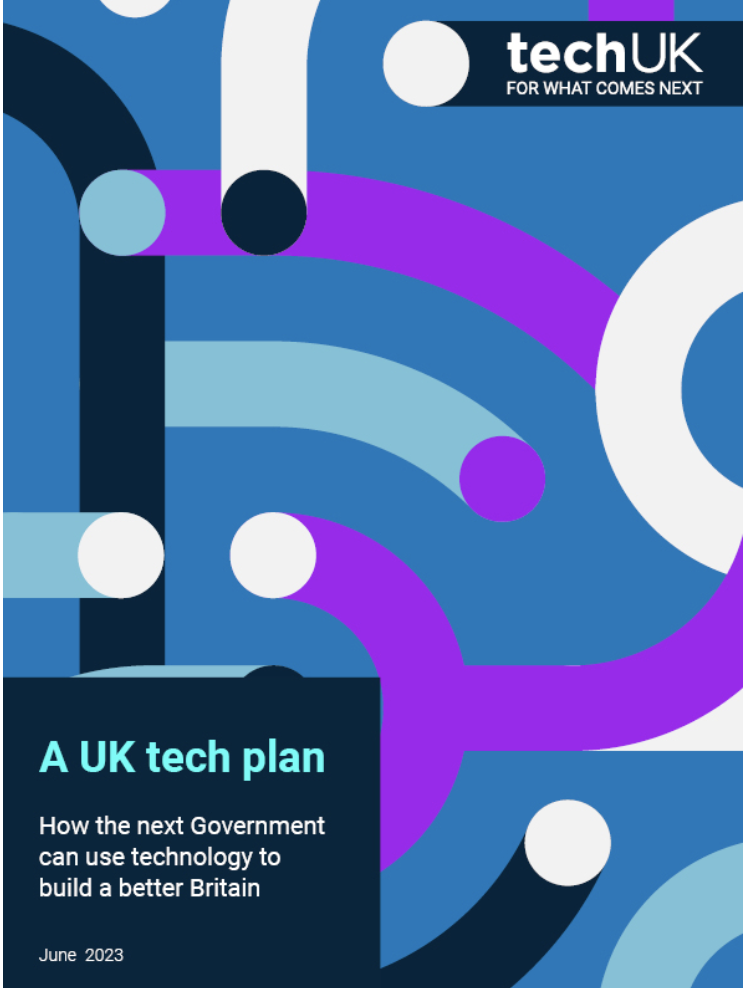A UK Tech Plan: How the next Government can use technology to build a better Britain

Non-profit organisation techUK has given its verdict on how the next government could deploy technology to create a better Britain.
In it's published plan "How the next Government can use technology to build a better Britain", techUK sought comment from its nearly 1000 members, ranging from SMEs, to UK champions and global businesses on how the next government can use technology to create a better Britain for people, society, the economy and the planet.
The organisation said: "As the UK approaches a General Election, there is a strong sense among the public and the business community that we face a series of fundamental challenges that will test the country whoever forms the next Government.
"The public will want the next government to give them confidence over their own and their children’s futures, set out solutions to economy-wide challenges such as a lack of business investment and stagnant productivity growth, ensure our public services can survive the challenges that the 21st century will throw at them, and have a plan for how the UK can play its part in combatting climate change."
But it acknowledges that the next government will have fewer resources to tackle these challenges. A series of crises from the 2008 financial crisis, to the pandemic and war in Europe have been compounded by the end of ultra-low interest rates. This means that the next Government will have to do more with less.
READ MORE: Buckinghamshire's InHealth strikes AI partnership to improve X-rays
But it doesn't see that fact as a deterrent. "An enormous opportunity is emerging with the increasing pace and power of technological innovation, offering solutions to the challenges the country faces. This opportunity is recognised right across our economy and society with virtually every business sector and public service seeing digital technology as the engine that will drive business growth or deliver more efficient, better and more resilient public services."
The tech sector is one of the UK's modern economic success stories, with its contribution to the economy rising over 25 per cent between 2010 and 2019, and now adding more than £150 billion. This makes it one of the country’s most valuable economic assets1 and the leading tech sector in Europe.
READ MORE: Government unveils £650 million life science funding
But there is now a fierce global race over the key technologies that will shape the future: from AI and Quantum to green technologies and semiconductors, competition between governments to attract talent, bring in investment and grow tech clusters is greater than ever. If the next Government does not make the most of the UK’s strengths, there is a real risk of it falling behind.
Summary of Opportunities
1 - Improve access to day-to-day digital services, cutting costs for both central and local Government as well as improving public services: update policy to introduce common standards and improve the interoperability of digital public services to cut the costs of administration for local authorities, and help UK companies seize the benefits of the global digital ID market predicted to value $40.44 billion by 2027.
2 - Make the UK one of the most trusted, safe and secure places to be online: launch a new online safety sandbox to help deliver the aims of the Online Safety Bill, facilitate a new cross sector data and intelligence sharing initiative between the tech, telecoms and financial services industries and publish a ‘top 5’ priority list of smart data schemes to put consumers back in charge of their data.
3 - Plug the digital skills gap to boost pay, opportunity and our national resilience: help raise British workers' pay by £5.69 billion by making the Apprenticeship Levy more flexible, delivering an Employment Bill, and building an online Digital Skills Toolkit to help individuals and employers identify accredited courses to boost digital skills.
4 - Make sure everyone has access to the online world: through a new future network strategy that could help 1 million people back into the labour market and add £159 billion to the economy by 2035 through the widespread uptake of 5G, and by using satellite and drone technology to help rural and hard-to-reach communities get connected.
5 - Deliver the digital transformation that the NHS and social care system needs: reform how we spend the existing £2.1 billion earmarked for NHS and social care digital transformation, so we can better onboard the technologies that will cut waiting times, save staff hours and support more preventative treatment.
6 - Rethink our approach to how technology can support the criminal justice system: enable the criminal justice system to better leverage digital tools could cut the cost to the public of cyber and fraud related crime in the UK, which amounted to £4.1 billion between April 2022 and May 2023.
7 - Regain the UK’s reputation as a global leader in Open Data and rank among the five countries on the UN E-Government Index: enact reforms to open up Government and public data sets to help create a better environment for UK Govtech solutions and improve our approach to public procurement.
8 - Ensure the UK holds on to its fintech crown: facilitate the uptake of new technologies such as AI and machine learning to deliver fintech services that speed up the delivery of a Central Bank Digital Currency and shore up the fundamentals of our fintech system by delivering reforms on Digital ID and Smart Data.
9 - Grow tech clusters across the UK: give local and combined authorities more incentives and confidence to invest in digital projects and review the roles of the British Business Bank and National Infrastructure Bank to accelerate digital transformation across local Government and support tech clusters across the UK.
10 - Support a thriving digital and AI ethics ecosystem to enable better governance and regulation: by establishing emerging tech taskforces under the Centre for Data Ethics and Innovation, promote education and training for digital ethics from the classroom to the boardroom and delivering an approach to artificial intelligence underpinned by a system of AI ethics, governance and regulation.
11 - Digitise the day-to-day economy helping small businesses get ready for the AI revolution: set up a costed Digital Growth Fund by reallocating money unspent under Help to Grow: Digital which could help 600,000 SMEs adopt new digital technologies such as AI and increase sales by as much as 18% over three years.
12 - Fix the UK’s broken scale up economy so British firms have the opportunity to become global champions: give start-ups certainty over existing support schemes and launch a British ‘Scale-up Sprint’ to identify, within six months, new investment vehicles and regulatory changes that could create new investment opportunities into critical technologies such as green tech, AI, quantum and semiconductors.
13 - Ensure we have a competitive innovation economy: set out a five-year plan for gradual reform of the UK’s R&D Tax Credit, bring down the cost and time it takes to get a connection to the national grid and reduce the cost of lab space, to make the UK a more competitive investment destination for highly innovative businesses and reach the target of 3.0% of UK GDP being invested in R&D per annum.
14 - Commercialise and deploy the emerging technologies vital to a growing and resilient economy: ensure the next Government builds on existing plans to support the commercialisation and deployment of emerging technologies, from AI and Quantum to semiconductors and autonomous vehicles, we could send strong signals to the market that the UK wants to be a hub for emerging technologies that will shape the future economy.
15 - Build a smarter approach to foreign and trade policy for the UK in a more complex and less secure world: focus UK efforts on supporting multilateral systems such as the WTO, take targeted action alongside allies to secure supplies of key technologies such as semiconductors, and update rules on investment screening and how the Government consults on new free trade and digital economy agreements, to enable the UK to build a smarter and more responsive approach to foreign policy and international trade.
16 - Boost the competitiveness of the UK as a green technology hub: add £13.7bn to the economy by 2030 through reforms to the grid, Environmental Social Governance requirements, and providing a database of green tech investment prospects.
17 - Empower individuals and businesses to better understand and improve their own environmental footprint: change planning rules so all new homes can support smart tech that can empower people to better manage their energy bills, create standards so home smart tech is interoperable and reduce the cost of switching and speeding up the rollout of EV charging points.
18 - Make tech greener: deliver a strategy to recycle and re-use the UK’s e-waste and critical minerals, reduce our dependence on imports, digitise the grid to reduce the cost of reaching net zero by up to £16.7bn per year, and secure a first-mover advantage in biodiversity reporting.














